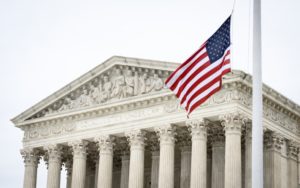
Courts appear split on Texas immigration law, EPA expects electric vehicle market dominance in eight years, and more…
IN THE NEWS
- The U.S. Supreme Court allowed a Texas law that authorized its police to arrest suspected illegal entrants into the United States to go into effect. The Court did not rule on the law’s constitutionality, which the Biden Administration challenged for intruding on federal authority. Hours later, a panel of three judges from the U.S. Court of Appeals for the Fifth Circuit ordered that a lower court’s previous injunction blocking the Texas law should stand with no further explanation, blocking the bill once again. The law, SB 4, also makes illegal entry through the US-Mexico border a misdemeanor punishable by up to six months in jail, and requires convicted migrants to be returned to Mexico.
- The U.S. Environmental Protection Agency (EPA) issued a final rule setting strict pollution standards for automobiles to limit carbon emissions. Under the new standards, EPA projects that most passenger vehicles or trucks sold in the United States will be hybrid or electric by 2032. EPA predicts that the rule will create new jobs in the auto industry and save American drivers approximately $6,000 annually from lower fuel and car maintenance needs. Ali Zaidi, the White House National Climate Advisor, stated that the rule demonstrates that the United States is “moving faster and faster to take on the climate crisis.”
- EPA issued a final rule that would ban the use of asbestos, a carcinogenic material used to manufacture products such as home insulation, cars, and home appliances, under the Toxic Substance Control Act. EPA reported that asbestos exposure is linked to almost 40,000 deaths annually. The ban is a part of the Biden-Harris Administration’s Cancer Moonshot initiative to lower cancer rates and improve cancer patient care. EPA Administrator Michael S. Regan stated that “EPA is so proud to finalize this long-needed ban on ongoing uses of asbestos,” which puts “the nation’s chemical safety program back on track.”
- The U.S. Food Safety and Inspection Service issued a final rule establishing requirements for how food producers label and disclose products made in the United States. The final rule makes disclosing products originating from the United States voluntary, but food producers who choose to label their products “Product of USA,” or “Made in the USA” must meet certain requirements. For example, an animal food product producer seeking to label their products in this manner must prove that the animals used in creating the product were raised and slaughtered domestically. The agency argued that this clarification was necessary to prevent deceptive food labeling practices.
- EPA issued a final rule strengthening emissions standards for commercial facilities that sterilize ethylene oxide, a known carcinogen. This rule comes after EPA conducted a periodic review of the lingering threat posed by ethylene oxide, which is mandated by the Clean Air Act. EPA estimated that the rule will reduce emissions of ethylene oxide from commercial sterilizers by 90 percent, particularly benefiting minority communities.
- Alabama Governor Kay Ivey signed a bill that bans the use of state funds for diversity, equity, and inclusion (DEI) policies and positions at state agencies and higher education institutions. The bill also requires public universities to designate bathrooms according to biological sex and bans the promotion of “divisive concepts,” such as ideas that could make someone feel guilty about their race, sex, or religion, in some public settings. NAACP President Derrick Johnson stated that the bill and attacks on DEI are “part of an anti-Black agenda.” Governor Ivey characterized DEI as a tool used by bad actors to “push their liberal political movement counter to what the majority of Alabamians believe.
- The Kentucky House of Representatives passed a bill that would defund Diversity, Equity, and Inclusion offices at public universities. The bill, which now awaits the Kentucky Senate’s approval, would also prohibit the approval of degrees that require students to take courses that teach “discriminatory concepts.” These concepts are defined in the bill as any concepts concerning racism or sexism that may cause an individual to feel guilt or psychological distress. Representatives opposed to the bill are concerned that it will harm minority students and pose a threat to academic freedom.
- The British Parliament introduced a bill that would establish an independent regulatory agency to oversee professional football (soccer). The proposed agency would be authorized to increase financial regulation and oversight of club management, sanction irresponsible owners, and prevent clubs currently competing in English leagues from joining other proposed international leagues. British Prime Minister Rishi Sunak stated that the bill was a “historic moment for football fans—it will make sure their voices are front and center.”
WHAT WE’RE READING THIS WEEK
- In a paper issued by the Institute for Law and Economics, Jill Fisch, a professor at the University of Pennsylvania Carey Law School, discussed the U.S. Supreme Court’s recent scrutiny of the administrative state. Although some commentators have argued that ideological opposition has motivated the Supreme Court, Fisch argued that the Supreme Court is justified in questioning the legal justification for the administrative state because agencies have become more politicalized and less focused on technical expertise. Rather than diminish the power of the administrative state, as Fisch argued that the Supreme Court seems poised to do, Fisch proposed a set of reforms to restore agency expertise and political neutrality.
- The U.S. Government Accountability Office (GAO) declassified a report evaluating the Department of Defense (DOD) law of war policies, which govern rules against torture and unnecessary destruction. Although DOD maintains a system for reporting alleged violations, the GAO found that it lacks a system for “retaining comprehensive records” of reported violations. The GAO discovered that the U.S. command in Africa uses an outdated definition for what qualifies as a “reportable incident,” the U.S. command in the Middle East fails to retain all reports of law of war violations, and the office specifically tasked with sending these reports to DOD had incomplete records. The GAO recommended that DOD develop a comprehensive recording system that would retain records of alleged law of war violations.
- In a working paper, Jonathan Feingold, an associate professor at Boston University School of Law, and Joshua E. Weishart, a professor at West Virginia University College of Law, argued that “discriminatory censorship laws,” which limit instruction about race and gender identity, have resulted in both hostile learning environments and miseducation. Feingold and Weishart explained that these laws limit students’ access to a full education, which includes important knowledge on topics such as racism and sexism. Feingold and Weishart suggested that Congress hold hearings on the impacts of discriminatory censorship laws and that the U.S. Department of Education issues legal guidance for educators confronted with such laws.
EDITOR’S CHOICE
- In an essay in The Regulatory Review, Chui Ling Goh, a doctoral candidate at Melbourne Law School and former Olympic athlete, analyzed whether the International Olympic Committee’s amendment to its Rule 50, which banned demonstrations and political or racial propaganda at any event, balanced the right to freedom of expression with the Olympic Games’s principle of “political neutrality.” Since prevailing international law supports large, peaceful demonstrations, Ling Goh argued that the amended Rule 50 could qualify as a disproportionate restriction on free expression. Ling Goh noted that international discussions about demonstrations at sporting events reveal a trend of athlete activism focused on human rights principles, while “neutrality” remains an aspirational goal for sports organizations.



